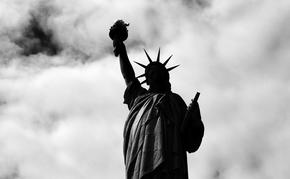The views expressed in our content reflect individual perspectives and do not represent the authoritative views of the Baha'i Faith.
What’s the scariest, most terrifying thing you can imagine? When you look at our culture’s art lately – literature, film, music, drama – you might conclude that we’re all really frightened of the future.
If the arts reflect our collective psyche, apocalyptic scenarios abound. In popular films like Don’t Look Up, a comet threatens the planet, maybe as a metaphor for climate change or world war or environmental collapse. In many other books and movies, nuclear holocaust turns the entire planet into a blasted, foreboding hellscape. Post-apocalyptic fiction now has its own genre. The proliferation of grisly horror stories also reflects something dark and disturbing about the human condition, implying that we have no hope and no alternative. Death, devastation, and disaster have become the staples of the entertainment industry. Their message: the world is terrible, and we’re all doomed.
RELATED: Managing Anxiety About the Future
Maybe that’s why it seems so hard to stay happy in this culture of corrosive pessimism and pain, right?
Then what, as a friend asked me after I took him to a particularly lively Baha’i meeting a while ago, gives the world’s Baha’is such a positive view of the future? He said, and I quote, “What is it with you people? What are you so dang happy about?” (He’s a cynic, I should add, with a jaundiced view of humanity in general, which makes him a pretty funny guy sometimes.)
Even though he had asked his questions while smiling, and at least partly with his tongue placed firmly in his cheek, they still made me wonder. From one perspective, the world does look pretty hopeless, and any optimism seems unwarranted. But despite all that, Baha’is have lots of hope. Why?
Perhaps that hopeful outlook comes, as Abdu’l-Baha’s astonishing announcement in the Baha’i writings suggests, from the advent of a new spiritual message meant for all humanity:
O peoples of the world! The Sun of Truth hath risen to illumine the whole earth, and to spiritualize the community of man. Laudable are the results and the fruits thereof, abundant the holy evidences deriving from this grace. This is mercy unalloyed and purest bounty; it is light for the world and all its peoples; it is harmony and fellowship, and love and solidarity; indeed it is compassion and unity, and the end of foreignness; it is the being at one, in complete dignity and freedom, with all on earth.
In 1863, when Baha’u’llah’s new revelation dawned, he wrote this urgent call to humanity, asking us to see, with our spiritual eyes, the fresh outpouring of God’s grace:
Hear Me, ye mortal birds! In the Rose Garden of changeless splendor a Flower hath begun to bloom, compared to which every other flower is but a thorn, and before the brightness of Whose glory the very essence of beauty must pale and wither. Arise, therefore, and, with the whole enthusiasm of your hearts, with all the eagerness of your souls, the full fervor of your will, and the concentrated efforts of your entire being, strive to attain the paradise of His presence, and endeavor to inhale the fragrance of the incorruptible Flower, to breathe the sweet savors of holiness, and to obtain a portion of this perfume of celestial glory.
However, Baha’u’llah did not promise humanity all roses and no thorns. In one of his tablets, he penned this prophecy:
How long will humanity persist in its waywardness? How long will injustice continue? How long is chaos and confusion to reign amongst men? How long will discord agitate the face of society? …
The winds of despair are, alas, blowing from every direction, and the strife that divideth and afflicteth the human race is daily increasing. The signs of impending convulsions and chaos can now be discerned, inasmuch as the prevailing order appeareth to be lamentably defective.
At first glance, this dark assessment from Baha’u’llah would appear to align with the apocalyptic point of view so prevalent in our contemporary culture. But in that same tablet, Baha’u’llah followed “the winds of despair” with a universal admonition to replace “the prevailing order” by regarding the whole earth as one country:
Were man to appreciate the greatness of his station and the loftiness of his destiny he would manifest naught save goodly character, pure deeds, and a seemly and praiseworthy conduct. If the learned and wise men of goodwill were to impart guidance unto the people, the whole earth would be regarded as one country. Verily this is the undoubted truth. This servant appealeth to every diligent and enterprising soul to exert his utmost endeavour and arise to rehabilitate the conditions in all regions and to quicken the dead with the living waters of wisdom and utterance …
So how do the Baha’i teachings harmonize these two seemingly divergent visions of humanity’s future?
RELATED: What Gives People Hope for the Future?
Shoghi Effendi, the Guardian of the Baha’i Faith, later offered, in his 1941 book The Promised Day is Come, a way to conceptualize and reconcile them. He contrasted the joy Baha’is feel about the coming of a new divine messenger with a clear-eyed understanding of the lamentable current condition of the world:
God’s purpose is none other than to usher in, in ways He alone can bring about, and the full significance of which He alone can fathom, the Great, the Golden Age of a long-divided, a long-afflicted humanity. Its present state, indeed even its immediate future, is dark, distressingly dark. Its distant future, however, is radiant, gloriously radiant – so radiant that no eye can visualize it.
This warning – written during the time when the entire world had begun to plunge into the unprecedented horror of its most destructive and deadly world war – explains how the world’s Baha’is can simultaneously hold a realistic view of our current conditions and an optimistic outlook on humanity’s future prospects. While the Baha’i teachings fully recognize the perils of this violent and virulent phase in humanity’s collective coming-of-age, they also direct our eyes forward to the culmination of that turbulence in a future era that will witness the emergence of a global community, a collective consciousness of planetary citizenship, and the founding of a peaceful and harmonious world civilization and culture.
That vision, I told my friend, explains why I’m a Baha’i.

















Comments
Sign in or create an account
Continue with Facebookor